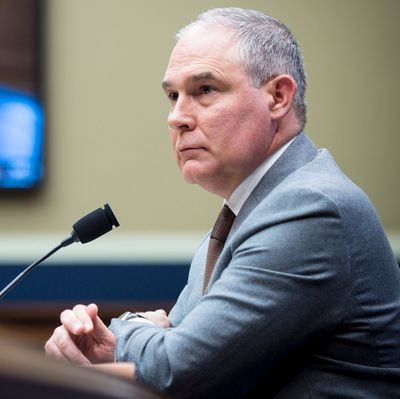
In recent weeks, we’ve learned that global carbon emissions rose last year, defying (optimistic) expectations that they had reached a peak. We also learned that no country on Earth is on track to fulfill its emissions-cutting commitments under the Paris climate treaty; that even if all of them somehow fulfill those commitments, nonetheless, their actions would still be insufficient to avert a two-degree increase in global temperatures; and that, in a two-degree warmer world, 150 million more people will die as a result of air pollution, than would in a 1.5-degree warmer one.
And as this flood of climate research revealed that humanity was (and is) hurtling toward an ecological holocaust of unprecedented proportions — one that can only be preempted by radical changes in our species’ use of fossil fuels — the top agency for environmental regulation, in the most powerful nation on the planet, was instructing its staffers to tell the public that there is no scientific consensus about “the role of human activity” in climate change, nor about “what we can do about it.”
On Tuesday night, the Environmental Protection Agency sent its employees a list of eight things they are allowed to publicly say about climate change. Shortly thereafter, someone forwarded those talking points to HuffPost. Taken together, the individual statements amount to the following message:
We recognize that climate change is happening and that it’s going to have profoundly negative consequences for many Americans. Therefore, we are committed to mitigating those consequences to some unspecified extent. That said, while the government has a role to play in helping people adapt to the coming nightmare, it has no business taking any significant action to prevent it. After all, no one can say for certain exactly how much human activity contributes to planetary warming, or how effective any given intervention would be at stopping it. And since most climate-change-prevention policies come with near-term economic costs, it’s best for government to do nothing — better safe than sorry!
Or, in the EPA’s (official) words:
EPA recognizes the challenges that communities face in adapting to a changing climate.
EPA works with state, local, and tribal governments to improve infrastructure to protect against the consequences of climate change and natural disasters.
EPA also promotes science that helps inform states, municipalities, and tribes on how to plan for and respond to extreme events and environmental emergencies.
Moving forward, EPA will continue to advance its climate adaptation efforts, and has reconvened the cross-EPA Adaptation Working Group in support of those efforts.
Human activity impacts our changing climate in some manner. The ability to measure with precision the degree and extent of that impact, and what to do about it, are subject to continuing debate and dialogue.
While there has been extensive research and a host of published reports on climate change, clear gaps remain including our understanding of the role of human activity and what we can do about it.
As a key regulatory voice, it is important for the Agency to strive for a better understanding of these gaps given their potential significant influence on our country’s domestic economic viability.
Administrator Pruitt encourages an open, transparent debate on climate science.
Of course, there aren’t “clear gaps” in “our understanding of the role of human activity” in climate change. The notion that industrial civilization is the primary cause of rising planetary temperatures has been affirmed by 97 percent of peer-reviewed research on the subject. And, as HuffPost notes, a research review from November 2016 documented significant methodological and/or analytical flaws in that other 3 percent.
It would be bleak enough if these talking points were an accurate reflection of our government’s position on climate change. “We will do nothing to stop this calamity from happening, but will help you prepare for its onset” isn’t the most uplifting sentiment. But the Trump administration’s actual position on the matter is even worse.
In truth, Scott Pruitt’s EPA is about as opposed to helping communities prepare for climate catastrophe as it is to regulating carbon emissions: Last year, the EPA shut down its climate-adaptation program, and proposed funding cuts to another initiative dedicated to studying the effects of rising sea levels.






























